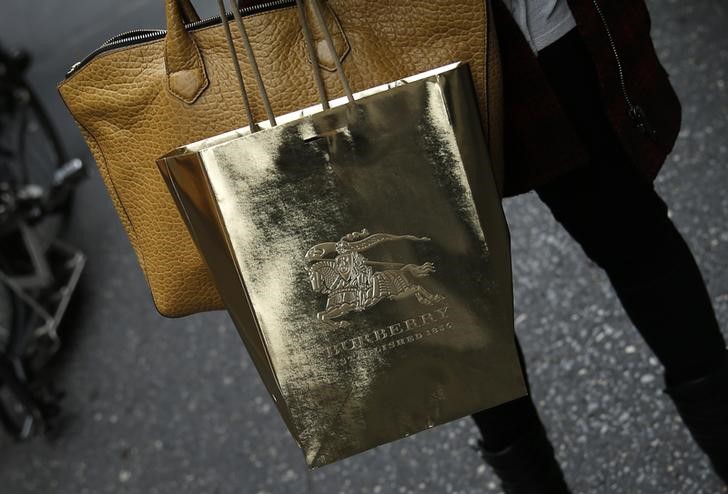By Astrid Wendlandt
PARIS (Reuters) - British luxury goods maker Burberry (L:BRBY) will adjust prices in response to currency fluctuations and similar moves by rivals, it said on Wednesday as it posted a forecast-beating 9 percent rise in second-half revenue.
Several luxury brands including Chanel, Richemont 's (VX:CFR) Cartier and Patek Philippe have moved to harmonise their prices globally following the rise of the U.S. dollar, the weakness of the euro and the surge in the Swiss franc earlier this year.
"We will maintain our price positioning by market relative to our immediate peers ... as prices move, we would also move prices up or down in the same way," Burberry Chief Financial Officer Carol Fairweather told reporters in a conference call.
Later in a call with analysts, Burberry said peers were brands such as Prada (HK:1913), LVMH's Louis Vuitton and Kering 's (PA:PRTP) Gucci.
LVMH on Tuesday said it was not going to adjust its prices but analysts said they had noticed Louis Vuitton had raised prices in Europe by 3-4 percent since the beginning of the year.
Currency movements have created notable price differentials, reaching more than 50 percent for the same luxury item between European and big Chinese cities.
The trend has encouraged Asian buyers to snap up goods in Europe and resell them at home, a practice often referred to as parallel trading or the grey market.
Broker JP Morgan Cazenove said in a note this month that some luxury goods executives and consultants believed 20 to 40 percent of luxury sales in mainland China were now parallel.
"Price adjustments and strict limitations remain in our view the only true defence against parallel trade," the broker said.
Burberry - known for its trademark trench coats with camel, red and black check linings, backed by ads featuring British models Kate Moss and Cara Delevingne - said trading in its high-margin Hong Kong market had decelerated further.
It said same-store revenue in Hong Kong, where it made about 10 percent of sales and where tourists make up 80 percent of the customer base, fell in "single-digit" terms in the second half.
Chinese tourists, an important Burberry customer group, have been avoiding cities such as Hong Kong following last year's pro-democracy protests, travelling instead to Europe, the United States and other Asian destinations such as Japan and Korea.
Burberry saw "double digit" sales growth in the United States and Europe and trading was particularly buoyant in Britain, France and Italy, from both locals and tourists.
Revenue from directly operated stores rose 13 percent at constant exchange rates in the half-year to March 31 and 9 percent on a same-store basis, slightly ahead of market expectations.

Burberry shares were up 0.34 percent at 1,789.